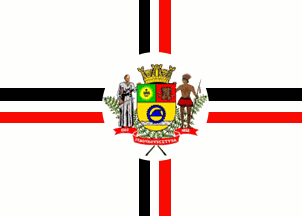 image by Dirk Schönberger,
19 November 2012
image by Dirk Schönberger,
19 November 2012Source: http://www.itaquaquecetuba.sp.gov.br/Institucional/ConhecaNossaCidade/Bandeira.aspx

Last modified: 2012-12-15 by ian macdonald
Keywords: sao paulo | itaquaquecetuba |
Links: FOTW homepage |
search |
disclaimer and copyright |
write us |
mirrors
 image by Dirk Schönberger,
19 November 2012
image by Dirk Schönberger,
19 November 2012
Source:
http://www.itaquaquecetuba.sp.gov.br/Institucional/ConhecaNossaCidade/Bandeira.aspx
A white flag, crossed by two black-white-red stripes to make an upright cross, overall a white disk with the municipal arms in the center.
Official website at
http://www.itaquaquecetuba.sp.gov.br
Dirk Schönberger,
19 November 2012
The flag is shown on the official site at http://www.itaquaquecetuba.sp.gov.br/Institucional/ConhecaNossaCidade/Bandeira.aspx
The flag of Itaquaquecetuba, designed by Gentil de Moraes Passos, is prescribed by Municipal Law No. 481 of 19 September 1969. The flag is made of "three vertical and three horizontal stripes, black-white-red forming a cross, over it a white disk charged with the municipal coat of arms, the whole on a white background." The width of each stripe is 1/12 of the flag's width. The diameter of the circle is 1/3 of the flag's width. The proportions of the flag are those of the national flag.
The white field is a symbol of purity and triumph. The cross is the symbol of the Christian faith. The three colors are the symbol of São Paulo State, representing on the State flag the black, Indian and white races.
The coat of arms of Itaquaquecetuba is "Per fess, 1a. Vert a heraldic sun with 32 rays charged with the letter 'IHS' ensigned with the three crucifixion nails united in base all sable, 1b. Gules a pioneer's jack proper, 2. Or a cog wheel orling a Mercury's helmet all azure over tow fesses wavy of the same. The shield surmounted by a three-towered mural crown or masoned and ports sable. The shield supported dexter by Father José de Anchieta holding a spear all proper and sinister by an Indian. Below the shield branches of bamboo and a scroll gules inscribed '1560 ITAQUAQUECETUBA 1953' in letters argent."
The rounded-off, per pale and per pale divided shield is traditionally used in Brazil. The first quarter represents the emblem of the Society of Jesus, as a tribute to the Jesuits, pioneers of social education, who influenced much and taught the natives as well as Brazilians of European origin in the early years of Brazil, especially in São Paulo de Piratininga, where they built a college on the site of the initiation of colonization. The emblem of the Society of Jesus is also the symbol of the religious faith of the inhabitants. The second quarter shows the pioneer's jack from the coat of arms of the municipality of Mogi das Cruzes is a tribute to the municipality of which Itaquaquecetuba was originally a district and eventually seceded. The golden field is a symbol of the underground resources. The fesses wavy symbolize river Tietê, the main geographical feature of the municipality, of noted significance for the expeditions to the hinterland that founded gold and extended our borders. The cog wheel, a symbol of industry, and Mercury's helmet, a symbol of commerce, represent the two main sources of income. The mural crown is the universal symbol of political and administrative emancipation. Father José de Anchieta founded the town. The Indian represents the first inhabitants of the area. The two figures symbolically protect the shield. The bamboo recalls the origin of the place name, from the Tupi words "taquaquicê", "bamboo", and "tuba", "abundance". The years 1560 and 1593 recall the foundation of the town and of the municipality, respectively.
http://www.itaquaquecetuba.sp.gov.br/Institucional/ConhecaNossaCidade/Brasao.aspx - Municipal website
Ivan Sache, 23 November 2012